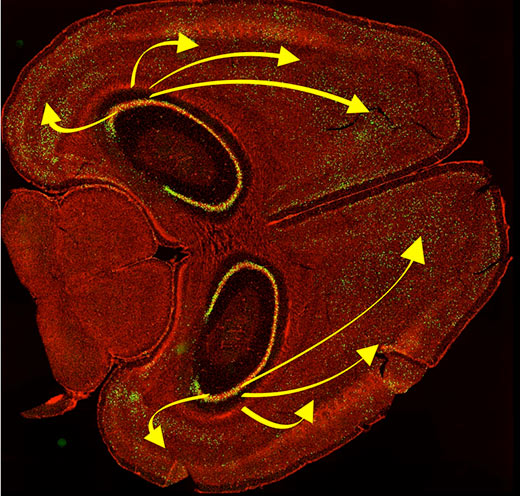Much like using UV light to erase data from an EPROM, researchers from UC Davis have used light to erase specific memories in mice. [Kazumasa Tanaka, Brian Wiltgen and colleagues] used optogenetic techniques to test current ideas about memory retrieval. Optogenetics has been featured on Hackaday before. It is the use of light to control specific neurons (nerve cells) that have been genetically sensitized to light. By doing so, the effects can be seen in real-time.
For their research, [Kazumasa Tanaka, Brian Wiltgen and colleagues] created genetically altered mice whose activated neurons expressed GFP, a protein that fluoresces green. This allowed neurons to be easily located and track which ones responded to learning and memory stimuli. The neurons produced an additional protein that made it possible to “switch them off” in response to light. This enabled the researchers to determine which specific neurons are involved in the learning and memory pathways as well as study the behavior of the mouse when certain neurons were active or not.
Animal lovers may want to refrain from the following paragraph. The mice were subjected to mild electric shocks after being placed in a cage. They were trained so that when they were put in the cage again, they remembered the previous shock and would freeze in fear. However, when specific neurons in the hippocampus (a structure in the brain) were exposed to light transmitted through fiber optics (likely through a hole in each mouse’s skull), the mice happily scampered around the cage, no memory of the earlier shock to terrify them. The neurons that stored the memory of the shock had been “turned off” after the light exposure.
The researchers could see from this study that the mouse brain’s cortex, hippocampus, and amygdala are all connected and involved in learning, creating, and retrieving memories. Thus was long suspected but took optogenetics to clearly illustrate. We did not see any clear information on whether the “off” neurons were ever turned “on” again for the purposes of this study; it would have interesting to conclusively see if any of the fear response returned in the mice when this occurred.
As exciting as this research is, we’re still a long way off from scenarios like Eternal Sunshine of the Spotless Mind, the advent of neuralyzers, or treatment of memory disorders in humans using optogenetics. Still, we are impressed with the results and hope to see more studies about the science of memory in the future.
Here is a video explaining optogenetics:
[via Techodrom]
















I know when I am exposed to a combination of UV light, and salinated H2O modulated with low frequency waves….I tend to forget all about work….
That’s the most glorious way of describing the beach I’ve ever heard.
I blame Agent J for this…
And someone beats me to it…congrats.
almost everyone in US has a gun no? this would be a great occasion tu actually use them! (not against the mice of course)
no actually the number of people who own guns is very small it’s just those that do own 10.. 12..100 at a time
“The latest Economist/YouGov poll shows that 39 percent of American households own guns, which represents a five percent increase over the number of gun owning households in 2012.”
How is this a hack?
It’s brain hax0rs and it’s pretty amazing!
To be HONEST, i would love if HAD would make a BIO section. This would ROCK! Or at least look into more BIO type projects.
I do plan to write about more BIO-related topics.
EEPROM mice :P
It would interesting to teach the mice how to turn on the UV light, see if they choose to erase the bad memories themselves. Would they want to safely live in fear or happily live with danger?
Happily live with danger. Not too dissimilar psychological testing on both humans and other animals indicate that decisions like that are made in the higher order parts of the brain in intelligent species. Ones that lack significant development in the frontal lobe (humans are freaks of nature about that) will side with their instincts, i.e. what feels good.
If you have a dog you can be mean and test it empirically. Give it all the food it could want. Nearly all breeds will eat and eat until they become sick, then they will vommit, eat it, then eat some more. The intelligent breeds will be more likely to stop before that happens.
Great response.
In other words, you’d need a mice with a Phd in Philosophy to make sure it can make the distinction :)
What a coincidence. Or were you listening to the best of art bell on seven radio today. Dr. Michio Kaku was talking about this. And also about recording memories and reinsert in them.
Flickering light from Television seems to alter human neurons too.
Make plenty of Zombies . . .
science fiction?
or
science fact?
BOTH!
Science faction
Hey, it’s all cool. If the researcher erases your memories of being tortured then you weren’t tortured, right?
Eternal sunshine of the spotless mind, here we go
Gaslighting, now with more light
Isn’t this the direction ALL the world’s research should be heading? -To better people as a whole? Cure diseases, mental disabilities at the top, addictions? If not used as a negative tool, hah!